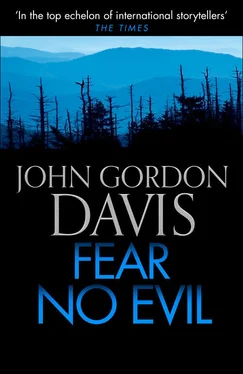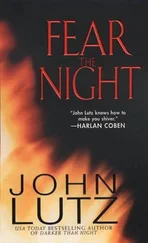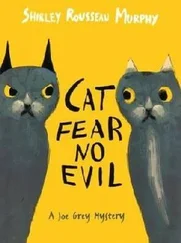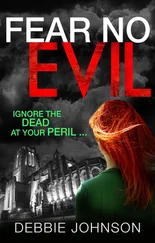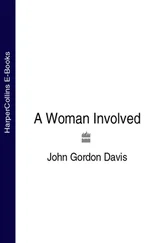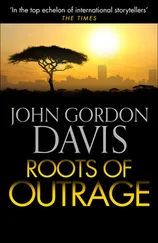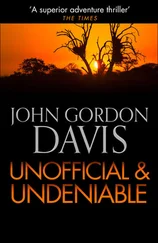John Gordon Davis
Fear No Evil
Copyright
HarperCollins Publishers
1 London Bridge Street
London SE1 9GF
www.harpercollins.co.uk
First published in Great Britain by HarperCollins Publishers 1982
Copyright © John Gordon Davis 1982
Cover photograph © Shutterstock.com
John Gordon Davis asserts the moral right to be identified as the author of this work
A catalogue record for this book is available from the British Library
This novel is entirely a work of fiction. The names, characters and incidents portrayed in it are the work of the author’s imagination. Any resemblance to actual persons, living or dead, events or localities is entirely coincidental.
All rights reserved under International and Pan-American Copyright Conventions. By payment of the required fees, you have been granted the nonexclusive, nontransferable right to access and read the text of this e-book on-screen. No part of this text may be reproduced, transmitted, downloaded, decompiled, reverse-engineered, or stored in or introduced into any information storage and retrieval system, in any form or by any means, whether electronic or mechanical, now known or hereafter invented, without the express written permission of HarperCollins e-books.
HarperCollinsPublishers has made every reasonable effort to ensure that any picture content and written content in this ebook has been included or removed in accordance with the contractual and technological constraints in operation at the time of publication.
Source ISBN: 9780007574445
Ebook Edition © SEPTEMBER 2014 ISBN: 9780008119270
Version: 2014-12-18
To my lovely wife Rosemary
Cover
Title Page
Copyright
Dedication
Map
Part One
One
Two
Three
Four
Five
Part Two
Six
Seven
Eight
Nine
Part Three
Ten
Eleven
Twelve
Thirteen
Fourteen
Fifteen
Sixteen
Seventeen
Part Four
Eighteen
Nineteen
Twenty
Twenty-One
Part Five
Twenty-Two
Twenty-Three
Part Six
Twenty-Four
Twenty-Five
Twenty-Six
Twenty-Seven
Twenty-Eight
Twenty-Nine
Part Seven
Thirty
Thirty-One
Thirty-Two
Thirty-Three
Thirty-Four
Thirty-Five
Part Eight
Thirty-Six
Thirty-Seven
Thirty-Eight
Part Nine
Thirty-Nine
Forty
Forty-One
Forty-Two
Forty-Three
Forty-Four
Forty-Five
Part Ten
Forty-Six
Forty-Seven
Forty-Eight
Forty-Nine
Fifty
Fifty-One
Fifty-Two
Fifty-Three
Part Eleven
Fifty-Four
Fifty-Five
Fifty-Six
Fifty-Seven
Part Twelve
Fifty-Eight
Fifty-Nine
Sixty
Sixty-One
Sixty-Two
Part Thirteen
Sixty-Three
Sixty-Four
Sixty-Five
Sixty-Six
Part Fourteen
Sixty-Seven
Sixty-Eight
Sixty-Nine
Seventy
Part Fifteen
Seventy-One
Seventy-Two
Seventy-Three
Seventy-Four
Seventy-Five
Seventy-Six
Part Sixteen
Seventy-Seven
Seventy-Eight
Seventy-Nine
Eighty
Eighty-One
Keep Reading
About the Author
Also by the Author
About the Publisher
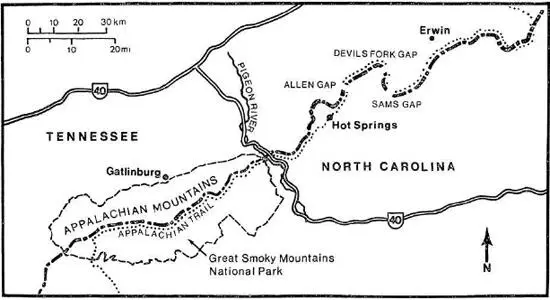
part one
Just over there, through the trees, was Fifth Avenue: cars and buses roaring, people hurrying, apartments, shops; the trees were budding, everything turning green, and there was a feeling of life in the sharp air around Central Park Zoo. It is a pretty little zoo, red brick covered with ivy, and at the entrance is a charming rotating clock tower: our childhood animals, cast in bronze, each are playing a different musical instrument, and as the clock turns it chimes a tune: the hippo is playing the violin, the kangaroo the trumpet, the goat the pipes, the penguin the drum, the jolly elephant the concertina.
This Saturday afternoon a young man was standing in Central Park, just outside the zoo gates, listening to the musical clock. He was twenty-eight years old, average height, lean, his thatch of hair jet-black, his skin clear and unlined; he was wearing a tracksuit and sneakers and his face was flushed from running. It was a strong, nice-looking face, but what struck you most were his eyes: they were beautiful—bright, deep blue, almost mauve, in certain light nearly black, and penetrating, and very warm, with thick lashes and dark eyebrows. Now his eyes were on the musical clock as it chimed five, and they were sad.
For down below in the zoo is very different from the musical clock. Over in the corner the great, solitary polar bear paced up and down in his cage, pad pad pad to the corner, blink, turn, pad pad pad back, blink, turn, pad back to the corner again; over and over, and over and over. His feet covered exactly the same spots, and his body went through exactly the same turning movement every time. All day, every day, for the rest of his life. In the Elephant House the great mammals shuffled back and forth, back and forth, their great trunks curling and slopping, curling and slopping, nothing to do, enormous feet shuffling over the same few yards of concrete, big eyes blinking. Sometimes they trumpet, an old primitive scream out of the great forests that crashes back off the Victorian walls. In the Big Cat House, the lions and the tiger and the jaguar and the snow leopard and the panther are prowling back and forth, back and forth, powerful hunting animals pacing four paces to the corner, blink, turn, four paces back, blink, turn; over and over. The lions are fortunate, for there are two in one cage, but in their pacing they get in each other’s way and have to make an identical movement to avoid each other, a terrible ritual, over and over. The other big cats are alone in their cages, and they cannot see each other. The puma is always trying to paw down the steel partition to get in with the jaguar. For the rest of their lives, four paces up, four paces down. It would make a difference to the big cats if they could just see each other, for solitary confinement is one of the worst punishments. But opposite their row are the cages of the gorillas, big hairy animals each twice the weight and size of two very big men, with faces and eyes that are almost human, and the male gorilla can see the female gorilla in the next cage just fine, but they just sit there and stare and eat their own excrement.
As the clock chimed an old black man came down the path.
‘Hello man.’
The young man turned with relief. ‘Hello, Ambrose.’
Old Ambrose looked up at him worriedly, then nodded his silvery head at the gates. ‘You not goin’ to knock this place over too, are you?’
‘No.’
Ambrose took a deep, apprehensive breath, and glanced side-ways. He reached up to the young man’s top pocket and dropped a bunch of keys in it.
‘Thanks, Ambrose.’
Ambrose looked up at the young man anxiously.
‘You only got an hour. Midnight to one. While we’re all havin’ dinner.’
The young man nodded.
‘And,’ Ambrose said, ‘the east gate will be open.’
The young man nodded again. ‘Thanks, Ambrose.’ Then he pulled two letters out of his tracksuit pocket. They were both stamped, and had express delivery stickers. ‘Will you mail these? Tonight, as soon as it’s over?’
Читать дальше
